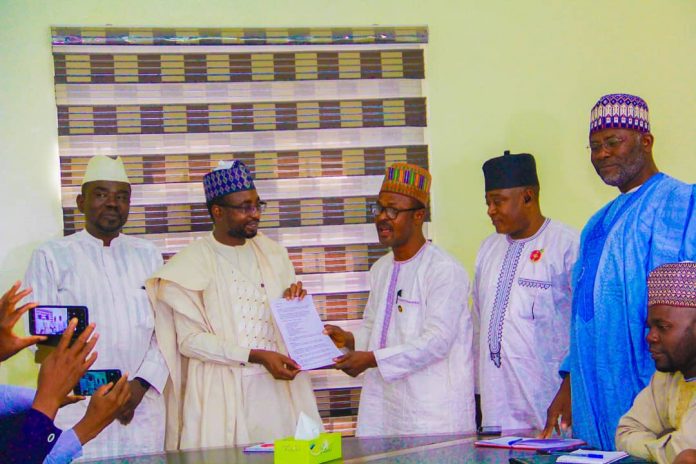NITDA: Managing digital tools for emerging journalism
By Inyene Ibanga
TECHDIGEST – Today, we live in a world where technologies are evolving faster than society’s capacity to adapt to them. As technology continues to gain increasing importance in our lives, digital literacy is becoming one of the key skills needed to function well in contemporary society.
Digital literacy is necessary to use and understand the way new technologies can help us actively live, work and contribute to society. It keeps people more connected and better informed to find technology options that are suitable to them.
In essence, digital literacy equips us with skills needed to live, learn and work in a world where communication and access to information are predominantly through digital technologies such as internet platforms, social media, and mobile devices. For instance, playing on your smartphone, using your email, and watching a video on YouTube.
Journalism is one of those notable professions in which digital/online journalism has started replacing traditional journalism. Several traditional media organisations have started going online to reach a huge audience.
This is because audiences are more comfortable with viewing stories than reading texts or listening to voices in narration about events. For this reason, many traditional media organisations (print, radio, and television) in Nigeria are shifting emphasis to online forms of information dissemination that focus on pushing more interactive images and videos.
Stakeholders in the profession of journalism are beginning to equip practitioners with various digital tools and online resources that can make them more efficient and productive.
Towards this end, journalists are determined to fully adopt the use of digital tools to generate, store, process, and verify information to tackle the menace of fake news and unethical practices.
This strong resolve was contained in the communique issued at the end of a three-day capacity building workshop held from December 29 to 31, 2021 at the PRNigeria Centre in Kano, with the theme, “Digital Reporting, Fact-Checking, and Social Media Management.”
Jointly organised by Image Merchants Promotion Limited and Penlight Centre for Investigative Reporting through the support of the National Information Technology Development Agency (NITDA), participants at the workshop came from both traditional and online media organisations.
Resource persons included members of academia and experts in the fields of technology, communications, digital forensics, and development journalism.
Topics discussed at the workshop included “Digital Journalism: Social Media and Tackling Fake News”; “Media Ethics and Responsible Reporting”; “Media Monitoring and Search Engine Optimisation”; and “Media Management”. Others were “Open Source Intelligence (OSINT)”; “Online Fact-checking: Basic Digital Tools for Journalism”; “Conflict Sensitive Reporting and Responsible Journalism”; and “Self-Censorship for National Security.”
The participants observed that digital technology is critical to the advancement of Nigeria’s economy and the promotion of the professional practice of journalism. As such it becomes mandatory for them to adopt digital tools to conduct fact-checking and investigative reporting.
They endorsed the importance of creating advocacy, awareness, and regulations to guide the practice of online and citizen journalism, as well as self-censorship to uphold patriotism and national security.
A high point of the recommendations included the call that intensive training programmes should be regularly organised to curb the abuse of social media and uphold ethical practices and global best practices.
The workshop canvassed that these strategic training programmes should focus on practical sessions to enable journalists to master the use of digital tools and that similar training should be extended to other states in the federation.
In another recommendation, the participants challenged practitioners to be patriotic, responsible, and ethical in setting agenda for driving national unity and stability by using digital tools, social media, and other web platforms to counter the fake news and all forms of vices affecting the country.
In furtherance of their determination to uphold the use of digital tools and observance of the ethical and responsible practice of online journalism, the participants expressed their commitment to ensuring that 20 per cent of their practice will focus on raising awareness on digital literacy and inclusion.
They pledged to exemplify the practical use of digital tools for fact-checking, investigative, and development journalism to encourage patriotic zeal and peaceful coexistence among the different sections of the country.
Mallam Kashifu Inuwa Abdullahi, the Director-General of NITDA attended the closing ceremony during which he received the “ICT Personality of the Year” award presented and instituted by the Network of Advocates of Digital Reporting (NADIR), in recognition of his enormous contribution to the growth of digital technology and the digital economy.
Having organised the digital journalism workshop earlier in Abuja and Ilorin, and now in Kano, there are indications that the partnership between NITDA and the private sector stakeholders will go a long way in promoting digital literacy and digital inclusion.
This was obvious from the participants’ preparedness and commitment to using digital tools to uphold professionalism in their work and sharing this new knowledge with their various audiences as the first step to arresting the threat of fake news and hate speech.
Inyene Ibanga is Managing Editor Techdigest and writes from Wuye District, Abuja; email: [email protected].
















